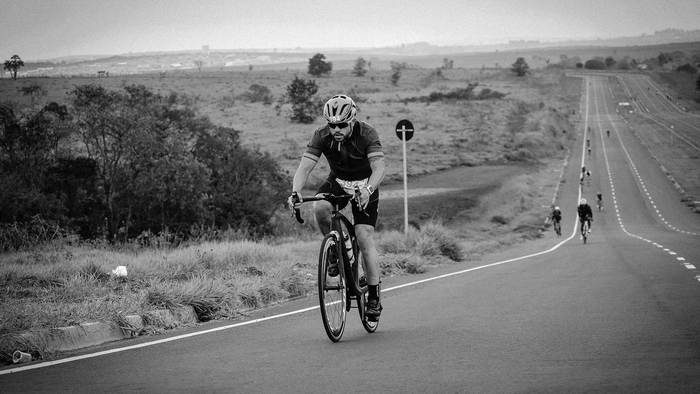Blog »
How do you keep going for an entire ironman?
Published 2 September 2019. Written by Chris Worfolk.

If you an age-group triathlete looking to complete your first full-distance triathlon, you might be wondering "exactly how do I keep moving for the 10-17 hours I'll be on the course?" In this article, I will offer some suggestions.
Do the training
If you fail to do the training and fail to finish, nobody will be surprised. There are three factors to this. The first is to ensure you have trained each discipline. You do not (and should not, given the uneven split between the distances) have to work on each discipline equally. But you do need to do enough to be comfortable with each one.
Second, you need the overall training load. If it is going to take you 15 hours to finish, ideally, you will be doing a few 15-hour training weeks in the lead up to the race.
Finally, you need to prepare for the distance. If you want to run a faster marathon, you are better off doing interval training than doing a lot of marathons. But if you just want to finish your first marathon: do distance work over speed work.
Once you have done this, you have achieved step one: prepare your body. You will also have started work on step two.
Believe you can
Next, we need to prepare our mind. We need to make ourselves believe we can do this. If you are blessed with a lot of self-belief, you may believe you can do an ironman straight away. However, for most of us, we need to work up to this. We have to show ourselves we can do it.
How do we do this? By taking little steps to reach our goal. Do a sprint triathlon. Then a standard distance, then a half. Run marathon. Cycle a 100-mile sportive. After you have done all of these things, you will start to believe it is possible to put them all together.
Second, there are a variety of psychological strategies you can use. I discuss mindfulness below, but there are many more that I teach in my psychology course.
Use mindfulness
The last thing you want to do at the start of a race is to think about how much there is still to go. That is where mindfulness comes in. It keeps us focused on the present moment, so we get on with the job, rather than worrying about what is to come.
Slow down
Suggesting that you pace yourself is somewhat cliche. But we are talking about more than that here. You may reach a point where you are so fed up with the race that you desperately want to speed up to try and get it over and done with.
You must resist this voice. Maybe if you are in the final few kilometres of the run, you can give it a go. But, for most of the race, you still have hours of racing left. So, listening to that little voice and allowing it to take you above your sustainable pace is going to lead to you exploding later on.
Keep eating and drinking
The rule of thumb for nutrition is one gram of carbs per kilo of body weight per hour. So, if you weigh 75g and it takes you 12 hours to complete the race, that is 900g of carbs. Of course, a lot of athletes, including me, do not hit that target. But just thinking about that amount of food can feel overwhelming.
Little and often is the order of the day. You do not need to try and "catch up" if you fall behind, as long as you are still feeling okay.
If you are not eating enough, you may find that your mood drops. This goes for the race and life in general. In which case, it is time to stop and eat. Think of it as an early warning sign.
Summary
The key to keeping going for an entire full distance triathlon is to ensure your body can handle the load, instil the self-belief that you can finish and make sure you are eating enough along the way. Above, I broke down how to do each of these steps.
Good luck, and drop me a comment to let me know how you get on!